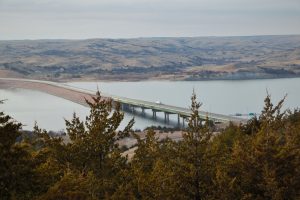
U.S. Sen. Mike Rounds (R-SD) sought to ensure the U.S. Army Corps of Engineers (USACE) was responsibly and properly managing the Missouri River during a Tuesday field hearing held in the state capitol of Pierre, S.D.
“The Missouri River plays a vital role in the economy and livelihoods of those of us living in communities along the river. We depend on the river for drinking water, recreation and agriculture. Proper management of the Missouri is an essential component to the success of our cities and towns,” said Rounds, chairman of the Senate Environment and Public Works (EPW) subcommittee on superfund, waste management, and regulatory oversight, in his opening statement.
The USACE is responsible for managing the Missouri River in a way that effectively maintains the river’s eight authorized purposes, which the congressman said are flood control, navigation, irrigation, hydropower, water supply, water quality, recreation, and fish and wildlife management.
“Proper management of the Missouri requires the Corps to work closely and communicate extensively with stakeholders such as state and local governments and understand the needs of the communities within the Missouri River basin,” he noted. “A healthy and well-managed Missouri River is critical to the communities surrounding it.”
The subcommittee hearing gave Rounds and other members an opportunity to gather feedback on the status of changes to Missouri River management practices, which the chairman oversaw following massive flooding along its banks in 2011 that caused millions of dollars in damage to homes, city streets, sewage systems and parks.
“Citizens and local government officials quickly focused on what steps should be taken to make certain this type of destruction never happens again,” said Rounds, noting that the Water Resources Reform and Development Act of 2014 was passed to provide USACE with more resources to bolster its flood monitoring capabilities and coordination across various government agencies of soil moisture and snowpack monitoring networks.
However, during a 2016 subcommittee hearing, USACE witnesses testified that “little progress” had been made in implementing the monitoring programs and a funding request for the program hadn’t been submitted to Congress, Rounds said.
“Additionally, we learned the Corps was unclear as to what agency should take the lead on implementing the program which also prevented them from moving forward with the snowpack monitoring network,” he said.
Rounds inserted language into the revamped 2016 bill that designated USACE as the lead agency for both the snowpack and soil moisture monitoring programs.
“Additionally, I was able to have an amendment included in the 2017 Senate Energy and Water Appropriations bill that would have provided the Corps with $2 million to begin implementation of the snowpack monitoring program,” said Rounds.
Subsequently, throughout this year’s runoff season, there has been a noticeable improvement in communication between USACE and stakeholders, he said.
“I look forward to receiving an update from the Corps and the state and local governments regarding their views of the coordination among stakeholders during this past runoff season,” Rounds said in opening up the hearing to testimony.



